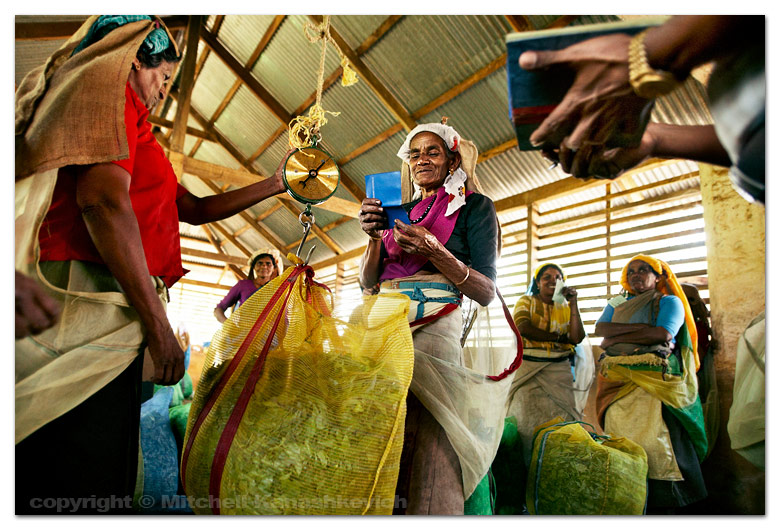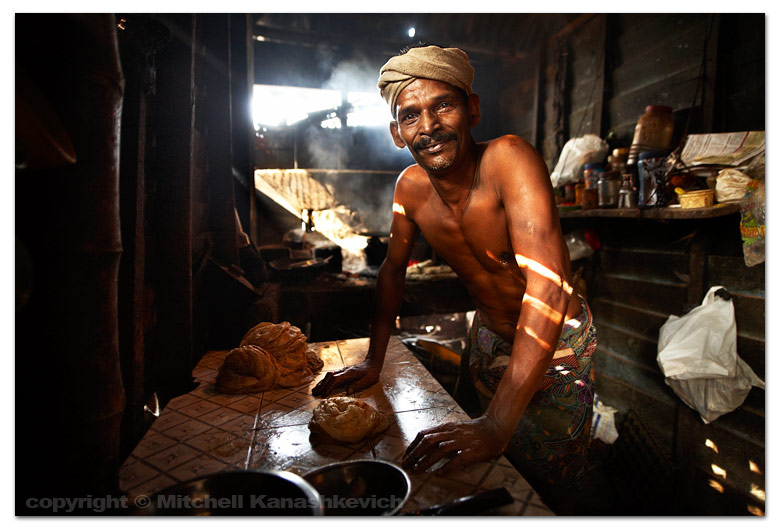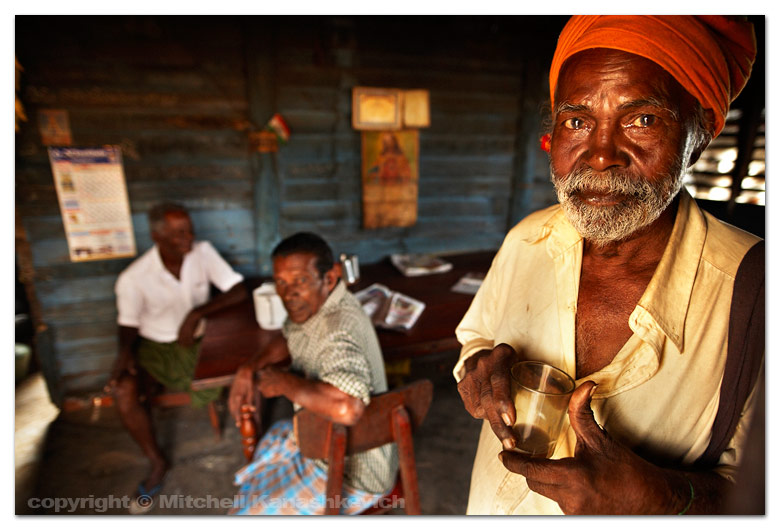 Vythiri, Wayanad - As we took our seats in the little restaurant the waiter brought out two glasses of water; he held the glasses from the inside so that his fingers were completely immersed in the water that we were meant to drink. When I was a child we used to have two types of juice served at the school canteen. Everyone liked only one flavor and so whoever would get to it first would dip his finger into the juice glass and proclaim - "This one' s mine! I dipped my finger into it!" None of the children would drink the juice which was probed with someone else's finger...I guess that mightn't be the case here.The fingers in the glass of water are a common sight in local restaurants all over India. It's such a small thing, but it always reminds me that the world which I come from is so different to this country that keeps luring me in with something new every time. It also reminds me that from our "Western" point of view there are so many of these little things which India just "doesn't get" and this is somewhat puzzling because regarding some of the bigger issues India has so much to teach the countries that "get" the little things.
Vythiri, Wayanad - As we took our seats in the little restaurant the waiter brought out two glasses of water; he held the glasses from the inside so that his fingers were completely immersed in the water that we were meant to drink. When I was a child we used to have two types of juice served at the school canteen. Everyone liked only one flavor and so whoever would get to it first would dip his finger into the juice glass and proclaim - "This one' s mine! I dipped my finger into it!" None of the children would drink the juice which was probed with someone else's finger...I guess that mightn't be the case here.The fingers in the glass of water are a common sight in local restaurants all over India. It's such a small thing, but it always reminds me that the world which I come from is so different to this country that keeps luring me in with something new every time. It also reminds me that from our "Western" point of view there are so many of these little things which India just "doesn't get" and this is somewhat puzzling because regarding some of the bigger issues India has so much to teach the countries that "get" the little things.
 The things that India doesn't "get" are numerous. They often surprise, even shock first time visitors, but usually they become somewhat funny, once they are long gone and exist only in the back of one's mind, as stories to tell friends.
The things that India doesn't "get" are numerous. They often surprise, even shock first time visitors, but usually they become somewhat funny, once they are long gone and exist only in the back of one's mind, as stories to tell friends.
Here are some of these little things:
- An omelet-maker scratching his crotch then serving you the omelet with the same hand.
- A cleaner in a fancy restaurant sweeping the rubbish near you while you eat, forcing you to lift your feet as he sweeps under your table.
- Sitting on the train looking lost with an empty plastic water bottle and a local saying "Give it to me please", taking it and tossing it out the window.
- A devotee at a temple reading religious texts into a microphone and occasionally coughing, snorting and spitting up phlegm while the sound is magnified to the full capacity of the speakers.
- VERY loud wedding processions. Loud means the sound from the speakers on the street will make your hotel room on the third floor vibrate like the inside of a night-club on a Friday night, oh and all the fun happens regardless of what time it is, meaning that the vibrations will occasionally get you up in the middle of the night.
 These are light-hearted examples, but occasionally there are those things that make you cringe long after they happen. I still remember how shocked I was, when for the first time I saw a youngster at Haridwar (a holy Hindu town) push a huge pile of rubbish into the Ganges - the holiest river for Hindus around India. Later I learned that it's normal here. Every picnic spot, every waterfall, beach and lake is polluted with wrappers, plastic bottles and whatever else. It mightn't be as bad as the industrial waste of some "first world countries" but close to a billion people throwing crap wherever they please can't be good for the environment, and it's just damn unpleasant. Am I criticizing the same people of India which I love? In some way "Yes", but I'm not doing it to say that "We" are better. Far from it. It's not like Indian general public don't have any idea about personal hygiene. Normally people don't even eat breakfast before showering and brushing their teeth, while most dwellings, these even include some that I've visited in the slums are spotless clean. I figure that teaching children not to throw rubbish into a river should be a much easier task than the one the "West" should undertake - teaching children to care for each other the way so many people in India do. I like to be naive and imagine that one day we'll all "GET IT" and the world will be one big, happy place :). My cynical side though, tells me that the day is still not even within sight.
These are light-hearted examples, but occasionally there are those things that make you cringe long after they happen. I still remember how shocked I was, when for the first time I saw a youngster at Haridwar (a holy Hindu town) push a huge pile of rubbish into the Ganges - the holiest river for Hindus around India. Later I learned that it's normal here. Every picnic spot, every waterfall, beach and lake is polluted with wrappers, plastic bottles and whatever else. It mightn't be as bad as the industrial waste of some "first world countries" but close to a billion people throwing crap wherever they please can't be good for the environment, and it's just damn unpleasant. Am I criticizing the same people of India which I love? In some way "Yes", but I'm not doing it to say that "We" are better. Far from it. It's not like Indian general public don't have any idea about personal hygiene. Normally people don't even eat breakfast before showering and brushing their teeth, while most dwellings, these even include some that I've visited in the slums are spotless clean. I figure that teaching children not to throw rubbish into a river should be a much easier task than the one the "West" should undertake - teaching children to care for each other the way so many people in India do. I like to be naive and imagine that one day we'll all "GET IT" and the world will be one big, happy place :). My cynical side though, tells me that the day is still not even within sight.
 Anyhow, I've been influenced by my experiences over the past few days. Perhaps all of the things that one becomes used to in "Indian India" became more apparent after our stay at Bylakuppe - "Tibetan India". Bylakuppe is not crowded, it's not loud and there are signs everywhere warning people not to litter. The signs are not always obeyed, but at least their presence means that there is some awareness. Our hotel room in Bylakuppe was spacious and quiet and had a view of a beautiful green garden from its window. This made our stay in the crammed room with "wall views" in Mysore that much more painful. But the most painful part came at night. Around 1am we were woken up by the sound of a TV at near full blast. Just as the noise died down and I began to doze off I was woken up again, this time by the sound of the "service buzzer" - an extremely annoying invention used to bring a hotel worker to your room. The problem with the service buzzer is that it makes a buzz so loud, the whole hotel hears it and hears it well. The room service however, only comes after the irritating sound is repeated several times. On this night the buzzer was pressed without any desire for room service - it was located near the bed and a hotel guest had simply pressed it in his sleep. The buzzing continued for about two minutes. Maybe I woke up the guilty party with my swearing in Russian (to make it less offensive :)) as I walked around the corridor trying to figure out where the buzz was coming from, in any case, thankfully the noise stopped.
Anyhow, I've been influenced by my experiences over the past few days. Perhaps all of the things that one becomes used to in "Indian India" became more apparent after our stay at Bylakuppe - "Tibetan India". Bylakuppe is not crowded, it's not loud and there are signs everywhere warning people not to litter. The signs are not always obeyed, but at least their presence means that there is some awareness. Our hotel room in Bylakuppe was spacious and quiet and had a view of a beautiful green garden from its window. This made our stay in the crammed room with "wall views" in Mysore that much more painful. But the most painful part came at night. Around 1am we were woken up by the sound of a TV at near full blast. Just as the noise died down and I began to doze off I was woken up again, this time by the sound of the "service buzzer" - an extremely annoying invention used to bring a hotel worker to your room. The problem with the service buzzer is that it makes a buzz so loud, the whole hotel hears it and hears it well. The room service however, only comes after the irritating sound is repeated several times. On this night the buzzer was pressed without any desire for room service - it was located near the bed and a hotel guest had simply pressed it in his sleep. The buzzing continued for about two minutes. Maybe I woke up the guilty party with my swearing in Russian (to make it less offensive :)) as I walked around the corridor trying to figure out where the buzz was coming from, in any case, thankfully the noise stopped.
 It's possible that this "wonderful" night contributed to us not wanting to stay in Mysore the next day, but more likely it was the fact that Mysore didn't offer us anything new. The fatigue of constantly moving around is catching up to us and we desperately wanted some peace and quiet, as well as something interesting to photograph :). Too much to ask for in India, sometimes, but after bouncing around a few towns in the breathtakingly beautiful Wayanad district we found what we wanted - a little YMCA hostel with a few private rooms, located amidst some spectacular tea plantations - my photographic subject for the next few days. Wayanad is not all perfect though, thanks to the hordes of mostly local tourists that do the things I previously mentioned make me cringe - eat, pollute and crap all over Wayanad's star attractions - the Pookote Lake, Soochipara Waterfalls and many more places. Thankfully we've had the peace and quiet we craved, I photographed what I wanted and now, rejuvenised, we're ready to continue our way to the most Southern point of India - Kanyakumari. Trissur, considered Kerala's cultural capital will be our next stop.
It's possible that this "wonderful" night contributed to us not wanting to stay in Mysore the next day, but more likely it was the fact that Mysore didn't offer us anything new. The fatigue of constantly moving around is catching up to us and we desperately wanted some peace and quiet, as well as something interesting to photograph :). Too much to ask for in India, sometimes, but after bouncing around a few towns in the breathtakingly beautiful Wayanad district we found what we wanted - a little YMCA hostel with a few private rooms, located amidst some spectacular tea plantations - my photographic subject for the next few days. Wayanad is not all perfect though, thanks to the hordes of mostly local tourists that do the things I previously mentioned make me cringe - eat, pollute and crap all over Wayanad's star attractions - the Pookote Lake, Soochipara Waterfalls and many more places. Thankfully we've had the peace and quiet we craved, I photographed what I wanted and now, rejuvenised, we're ready to continue our way to the most Southern point of India - Kanyakumari. Trissur, considered Kerala's cultural capital will be our next stop.
 Photos
I mostly photographed at one tea plantation, which was located not far from the place where I stayed. Coming back and photographing in the same place is beneficial because not only do you become familiar with the location, but the people you are photographing also become more familiar with you. The people at this particular plantation were absolutely wonderful. They were childlike in the way they became excited when they saw two foreigners enter their world, which I imagine for them is rather mundane. All eyes were on us. A smile would be met with a huge grin and shy laughter. In the distance we could hear the workers quietly telling each other what to say - '"What is your name?" "What is your native place?" and then someone would work up enough courage to ask the questions out loud. Our answers would be met with even more excited laughter and commotion. It seemed as if the workers were saying to each other "It worked! They understood us!". Taking a photograph of the women usually led to the women cracking up with shy laughter, while those that were outside of the photo would joke and say "Smile please!", until I would point the camera at them and they'd also crack up. Photographing at this tea plantation was one of those beautiful, simple, childlike experiences which makes me feel happy I'm doing this. Photography gave me a reason to be in what is simply a workplace for the people in my images and it brought a little laughter into their lives. If I could shoot in such stunning locations and have it this way all the time I wouldn't complain :).
Photos
I mostly photographed at one tea plantation, which was located not far from the place where I stayed. Coming back and photographing in the same place is beneficial because not only do you become familiar with the location, but the people you are photographing also become more familiar with you. The people at this particular plantation were absolutely wonderful. They were childlike in the way they became excited when they saw two foreigners enter their world, which I imagine for them is rather mundane. All eyes were on us. A smile would be met with a huge grin and shy laughter. In the distance we could hear the workers quietly telling each other what to say - '"What is your name?" "What is your native place?" and then someone would work up enough courage to ask the questions out loud. Our answers would be met with even more excited laughter and commotion. It seemed as if the workers were saying to each other "It worked! They understood us!". Taking a photograph of the women usually led to the women cracking up with shy laughter, while those that were outside of the photo would joke and say "Smile please!", until I would point the camera at them and they'd also crack up. Photographing at this tea plantation was one of those beautiful, simple, childlike experiences which makes me feel happy I'm doing this. Photography gave me a reason to be in what is simply a workplace for the people in my images and it brought a little laughter into their lives. If I could shoot in such stunning locations and have it this way all the time I wouldn't complain :).
 From top to bottom:
First: A worker carrying a bag of tea from the store-room onto a tractor, which takes the day's harvest to a factory for the tea to be processed. Those bags weigh about 50kg each.
Second: A crowd gathers outside the Mysore palace. During the festival of Dussehra and every Sunday from 7-8pm the whole palace lights up with ninety-six thousand lightbulbs. Just after the photo was taken I joined the crowd.
Third: View of the workers from the bottom.
Fourth: Tea Plucker (as they are locall called) named Vindhu at work.
Fifth: Carrying the harvest on a foggy morning.
Sixth: Weighing the harvest at the store room.
Seventh: Sun sets over the tea plantation.
From top to bottom:
First: A worker carrying a bag of tea from the store-room onto a tractor, which takes the day's harvest to a factory for the tea to be processed. Those bags weigh about 50kg each.
Second: A crowd gathers outside the Mysore palace. During the festival of Dussehra and every Sunday from 7-8pm the whole palace lights up with ninety-six thousand lightbulbs. Just after the photo was taken I joined the crowd.
Third: View of the workers from the bottom.
Fourth: Tea Plucker (as they are locall called) named Vindhu at work.
Fifth: Carrying the harvest on a foggy morning.
Sixth: Weighing the harvest at the store room.
Seventh: Sun sets over the tea plantation.
 During one of our days in Kollam we wanted to find out where the "Beach Road" led to, so we decided to ride it south, as long as it followed the shoreline. After passing a couple of fishing villages and beaches we came to a corner, there the road branched off inland. A small shack stood on that corner, smoke was coming out of its windows and people with tea glasses stood outside. Having come to the end of the "Beach Road" and not having any desire to head back to our room, we got off the motorbike and went into the smoky shack. Inside I found one of my favorite photographic places in Kerala.
During one of our days in Kollam we wanted to find out where the "Beach Road" led to, so we decided to ride it south, as long as it followed the shoreline. After passing a couple of fishing villages and beaches we came to a corner, there the road branched off inland. A small shack stood on that corner, smoke was coming out of its windows and people with tea glasses stood outside. Having come to the end of the "Beach Road" and not having any desire to head back to our room, we got off the motorbike and went into the smoky shack. Inside I found one of my favorite photographic places in Kerala. One early Sunday morning I realized that no one goes to work on Sundays, no fishermen would be going out to the sea. Since I had already gotten up early I headed off to the tea-shack in hopes of catching some customers having tea there. This gentleman had just come from church and was reading the news with a glass of tea in his hand. I asked if I could photograph him, he smiled and agreed. Initially he stared directly into the camera, but I asked him to look a little to the side, to make the portrait more casual.
One early Sunday morning I realized that no one goes to work on Sundays, no fishermen would be going out to the sea. Since I had already gotten up early I headed off to the tea-shack in hopes of catching some customers having tea there. This gentleman had just come from church and was reading the news with a glass of tea in his hand. I asked if I could photograph him, he smiled and agreed. Initially he stared directly into the camera, but I asked him to look a little to the side, to make the portrait more casual. Anitha cooking parothas, while Manuel prepares them. Manuel managed to communicate to me that everyday they go through 400 parothas, no small task for a tiny place like theirs. This was taken through the window that sporadically expelled smoke from the cooking fire.
Anitha cooking parothas, while Manuel prepares them. Manuel managed to communicate to me that everyday they go through 400 parothas, no small task for a tiny place like theirs. This was taken through the window that sporadically expelled smoke from the cooking fire. Manuel pauses while making parothas.
Manuel pauses while making parothas.









